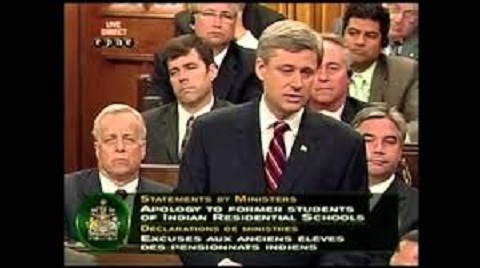“I stand before you today to offer an apology to former students of Indian residential schools. The treatment of children in these schools is a sad chapter in our history. For more than a century, Indian residential schools separated over 150,000 aboriginal children from their families and communities,” Former Prime Minister Stephen Harper said ten years ago today. “Two primary objectives of the residential school system were to remove and isolate children from the influence of their homes, families, traditions and cultures, and to assimilate them into the dominant culture. These objectives were based on the assumption that aboriginal cultures and spiritual beliefs were inferior and unequal. Indeed, some sought, as was infamously said, “to kill the Indian in the child”.”
Harper made those comments on the floor of the House of Commons June 11, 2008 as part of the formal apology from the federal government to survivors and families of the Residential School system.
The apology, compensation and the creation of the Truth and Reconciliation Commission comprised of the court approved settlement package.
It’s been a decade since Harper told the nation that this would be a new era in relations with Canada’s First Peoples. So, how has reconciliation and educating Canadians about the impacts of Residential School progressed?
Assembly of First Nation National Chief Perry Bellegarde admits that there has been some change, but a lot more work needs to occur. “We’ve made some progress, but we’ve got a way to go. Even looking back to what happened in Saskatchewan with the Colten Boushie trial, there’s systemic racism in the justice system. I’m not trying to paint a picture of doom and gloom, there is progress. But, there still needs a lot more work to get done,” Bellegarde said.
The cornerstone of the settlement agreement would be the establishment of the Truth and Reconciliation Commission. “A cornerstone of the settlement agreement is the Indian residential schools truth and reconciliation commission. This commission represents a unique opportunity to educate all Canadians on the Indian residential schools system,” Harper stated.
The TRC would travel to many communities in Canada, hearing raw, unfiltered testimony from survivors and their family members on how residential schools have impacted their lives.
The TRC would produce a final report with 94 Calls to Action, urging Canadians among other things to advance reconciliation and to educate themselves. Bellegarde says it was that report which served as the starting point for greater dialogue on residential schools. “It definitely was a catalyst for opening up people’s eyes across Canada about the impacts of residential schools, and the intergenerational trauma. We have to do a more effective job as well,” Bellegarde explained.
Bellegarde says he has been lobbying the Premiers to reform their educational curriculum to reflect residential schools and to teach about treaties.
“You have been working on recovering from this experience for a long time, and in a very real sense we are now joining you on this journey. The Government of Canada sincerely apologizes and asks the forgiveness of the aboriginal peoples of this country for failing them so profoundly,” said Harper.
(PHOTO: Then Prime Minister Stephen Harper apologizing for residential schools in the House of Commons. Courtesy CPAC)
